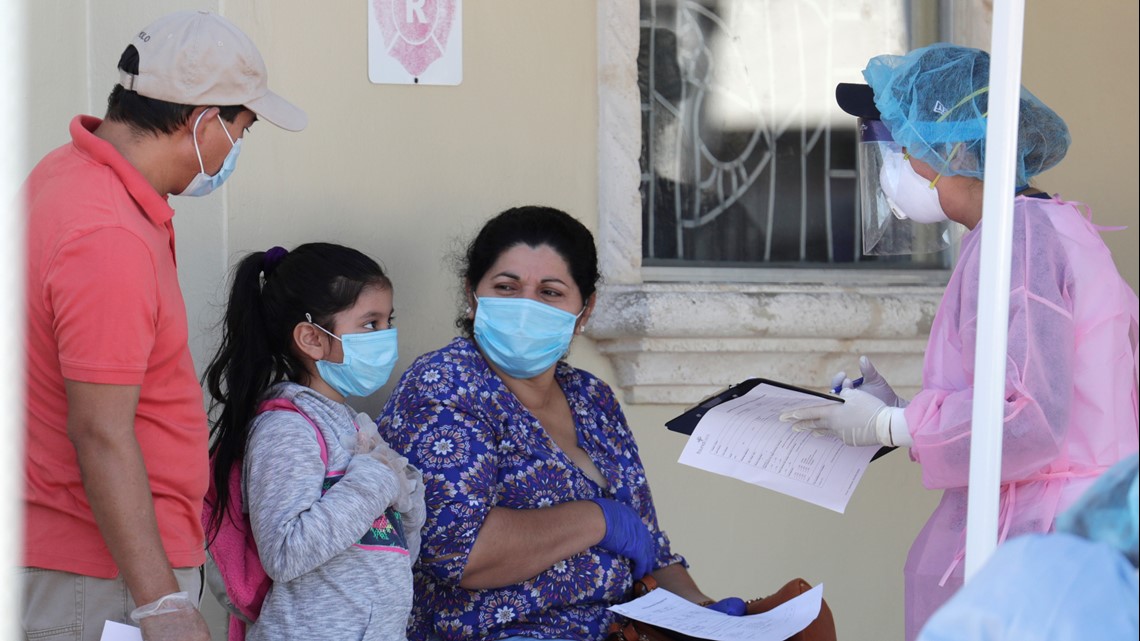Dr. Jane Lee, a UW social work professor, says poor immigrant access to health care has a ripple effect across society.
SEATTLE — Immigrants oftentimes face barriers other Americans may not face, including access culturally sensitive or affordable health care.
Dr. Jane Lee, an assistant professor at the University of Washington School of Social Work, studies health disparities and immigrant communities and tries to figure out how to address those disparities.
“The major gaps are that a lot of the services that are offered aren’t necessarily offered in ways that are culturally appropriate, aren’t offered in ways that make sense for those communities,” Lee said. “And so in order to address those gaps, we need to think about alternative and innovative ways to reach and access communities that might not necessarily have access to health services.”
Lee sat down with KING 5’s Joyce Taylor to talk about the challenges immigrant communities face with health care and why it’s a problem that affects everyone.
WATCH: Full episodes of Facing Race
The following is a partial transcript of their conversation. Some of the questions and answers below have been lightly edited for brevity and clarity.
Joyce Taylor: You study immigrant populations in relation to the social and political climate. Why immigrant populations in particular?
Jane Lee: Well, for a personal note, my parents were immigrants to the United States. I’ve always been interested in the health of immigrant communities specifically because I saw firsthand how immigrants face challenges and barriers to accessing health services. My father passed away when I was young due to health complications, and I became very passionate about addressing those challenges and barriers. And I’ve also worked in immigrant communities as a social worker, and I really recognized that these communities face so many challenges that are beyond those that other communities have to face. So, I really wanted to address those issues.
Taylor: What have you discovered in your research about how the current political and social climate is impacting immigrant populations?
Lee: Yeah. So my interest of this issue kind of emerged in 2016, when there was a lot of discussion about immigration, a lot of negative political rhetoric about immigrant communities. There was discussion about building a border wall, this depiction of immigrants as criminal and just this negative discussion about the immigrant community. And I really saw that this was having an impact on the psychosocial and emotional health of immigrant communities, regardless of the actual impacts of the policies or initiatives that were being put in place. Specifically, there was a sense of fear, anxiety, concern, and a lot of uncertainty about what was going on. And through my work, specifically, I conducted some interviews with Latino immigrants in the New York City area. And I learned that there was this sense of unease and fear, hopelessness, and that translated into behaviors and actions. Because of that fear, communities and individuals were concerned about seeing a doctor because of potential violence or experiencing discrimination or potential deportation, and not only how that might impact their own lives, but their families and their communities.
Taylor: Has that gotten worse over time? You said you started that work in 2016. Now, here we are 2020?
Lee: I don’t think it’s lessened. That’s for sure. And in some of my more recent work, I really found that we need to find different ways to reach these communities, because our current systems aren’t serving their needs and aren’t culturally appropriate. They aren’t tailored to address the needs of those of immigrant communities.
Taylor: What has your work told you about how the climate socially and politically is impacting immigrant communities?
Lee: It’s shown me that there are psychosocial and emotional impacts on these communities. And that that translates into behaviors, whether it’s not going to access services or not going to the doctor because of fear about what might potentially happen. And that translates into negative health outcomes, because when you don’t seek preventive services or when you don’t go to see a health provider that can negatively impact your health.
Taylor: Did you learn anything about how it impacts children relative to adults or men, relative to women?
Lee: So I kind of looked at the community more broadly, but what I can say is that families are so interconnected, and the health of parents translates into the health of their children, wives and husbands and just friends and family. So what I noticed is that even if an individual didn’t identify as undocumented or didn’t express concern about deportation, or some of the policies that were being discussed, they knew somebody who might be impacted whether it was an uncle or a grandparent or a friend, and that impacted their own psychosocial health and their own concerns and emotions about everything that was going on, which also translated into health behaviors and health outcomes.
Taylor: And what is the impact of that over time psychologically on one’s mental health?
Lee: That’s a great question, especially because for immigrants, a lot of that stress and trauma begins even before they arrived to the United States. They’re often leaving contexts or situations that are dangerous or violent. And even we can all speak from our own experiences of just moving from one city to another – just how stressful and difficult that can be. And add on the layer of context that isn’t necessarily welcoming to you that when there’s discussions about negativity and deportations or violence towards communities, and when you’re part of that community, that further compounds your own experience and the stress that you have to deal with, which can shape your own health and wellbeing.
Taylor: To talk about the idea of othering, this idea of pitting people against each other, that it’s those people over there that doesn’t impact me. Isn’t it a humanitarian issue that you’re talking about?
Lee: It definitely is a humanitarian issue at this device of nature, this us versus them, it’s all part of these intersecting systems of oppression that continue to marginalize and disadvantage certain groups. And it has a detrimental impact on all of society.
Lee: In ways in which communities continue to be disadvantaged, so there is this continuous divide between particular groups that can lead to violence. And this perception of potential discrimination and stigma associated with identity, which is so harmful, not just for the individuals who hold those identities, but for other communities, because we can think about our own selves and how we have different roles and identities of who we are, whether that’s a mother, whether that’s a parent, a friend, and when particular identities are marginalized, that impacts our whole selves and other communities who might have those identities as well.
Taylor: If you look at the state of things, I ask myself the question, are we raising a generation of children who feel it’s okay to marginalize populations and a generation of children who feel marginalized? And what’s the impact of that?
Lee: I’m a recent new mother, so I hope that that’s not what is happening. But that tends to be the case of what we’re seeing just based on this most recent administration and a lot of the discussions that have been happening. The sense of othering can be really harmful. And I think we need to recognize that it not only harms those who are being otherized or marginalized but our own communities and our own selves.
Taylor: The cliché – the apple doesn’t fall far from the tree. Our children absorb our ideas and pass on our ideas, right? So if we are living in a time of marginalizing communities, what do you think needs to happen to break that cycle?
Lee: That’s a great question and I think it’s a complex question with a complex answer. First and foremost, we need to tackle the systems that perpetuate disadvantage and inequity. But at the individual level, I think we can start to think about our own biases and perceptions about particular communities, including immigrant communities, whether they be conscious or unconscious, and think about whether our beliefs might perpetuate that those disadvantages. And also in just the ways in which we act and behave, we can support businesses or organizations that might be more inclusive, and also in the ways in which we vote or support particular people that promote inclusivity and equity for all communities.
Taylor: Do the outcomes in your study apply across the board for documented and undocumented immigrants?
Lee: I think, in some of my research, there are some differences in outcomes based on undocumented versus documented communities. We know that undocumented folks tend to lack health insurance, they tend to have more limitations in terms of access to health services. So that could lead to differences and health outcomes. But I will say, as I mentioned earlier, just the interconnectedness of our immigrant communities and multigenerational households that immigrants live in. So, one person might be documented, but their parents or their family members might be undocumented, and that has a multiplicative effect on the health of both communities.
Taylor: Are there some unique health factors that immigrant populations face that the general population does not face?
Lee: So a lot of my work has focused on HIV/AIDS and sexually transmitted infections. And I think with regard to that particular outcome, because it’s an outcome and a disease that has tended to be stigmatized, I think there is this double layer of challenges to accessing preventive health services for HIV prevention or STI prevention. So in those ways certain communities who are already stigmatized or marginalized might experience worse outcomes in terms of health outcomes that are stigmatized home outcomes.
Taylor: Recently, there’s been a lot of talk of African Americans in particular facing a sort of double pandemic with COVID and systemic racism. Do you see the same thing with immigrant populations?
Lee: Definitely. And just because there are these intersecting systems of oppression, so when we’re talking about immigration, we’re also talking about race, ethnicity, we’re also talking about linguistic barriers, we’re talking about a multitude of factors because they all intersect. And so with the immigrant community, particularly the Latino community, we’ve seen disproportionate rates of COVID in that community. And that’s in large part due to their roles as essential workers, living in multi-generational households. So not only are they exposed to coronavirus, but compound that with their barriers to accessing health services. And there’s a multiplicative effect or an exponential impact on their health.
Taylor: What is the greatest factor influencing the mental health of immigrant communities?
Lee: I think it largely depends on which immigrant community the challenges that they’re facing. But I can say that an important way to kind of mitigate some of those negative impacts on mental health is providing culturally appropriate information, resources for the community to address their mental health needs. And those resources and programs need to be delivered in ways that are acceptable for those communities. And they also need to be informed by the communities. So immigrants should have a say in how they want mental health services delivered to them or physical health services, so that they can thrive, because truly immigrants and other communities are resilient, and we have a lot of strengths. So really capitalizing on those strengths is important for improving mental health and physical health outcome.
Taylor: When you talk about mental health and the impact on the immigrant populations, what is the impact?
Lee: I think it varies based on communities, whether it’s adolescents or older adults or different immigrant communities by race-ethnicity. But I do think what’s tended to occur in the immigrant community is this lack of discussion about mental health, which can further exacerbate some of the issues. So if we’re not talking about symptoms of depression or feeling stressed or anxious and not seeking providers who could address those mental health concerns, that can further exacerbate some of the negative outcomes associated with that.
Taylor: I think about especially children of immigrants in schools, who just sort of are under the radar, and teachers are not really thinking about the impact of all of the things you’re discussing and studying on children, in addition to the other things they’re dealing with, like other kids in their classrooms. It’s hard to know what’s happening with those kids in the classroom.
Lee: Now, that’s a great point. So I think, you know, providing information and resources to immigrant communities in the language that they prefer is really key to ensuring that people have access to that information and are able to, you know, talk to their children about it, talk to other family members about it and begin to kind of address those issues together.
Taylor: There are those who would say, ‘Why should I be concerned about the mental health or physical health of immigrant populations when it doesn’t concern me?’
Lee: I would say that it does concern you, because our communities are so connected and the health of immigrants will affect our own health. Whether that’s because of the roles that immigrants play in our society, fulfilling essential roles across different sectors. So when immigrants aren’t their best or aren’t healthy that will impact our own livelihood and our own wellbeing.
Taylor: What gaps in the system has your work exposed, and what are the remedies?
Lee: I think there are a lot of gaps in our system, particularly in serving communities of color, immigrant communities. And the major gaps are that a lot of the services that are offered aren’t necessarily offered in ways that are culturally appropriate, aren’t offered in ways that make sense for those communities. And so in order to address those gaps, we need to think about alternative and innovative ways to reach and access communities that might not necessarily have access to health services. Think about, for example, using lay health workers or community health workers, members who are individuals who are part of those communities that know their communities and can provide health services or information in ways that are culturally sensitive and culturally tailored.
Taylor: Are you seeing more of that happening?
Lee: I think there are definitely efforts to increase those efforts. And in order to do that we need more funding, more support. And I think slowly but surely we are able to do that.
Taylor: Are there programs in our state that are successfully addressing the gaps you described?
Lee: I think there’s a lot of research going on, a lot of efforts, community based efforts, partnerships with community organizations, which are so critical, that do know their communities and are trying to create innovative programs, think about creative ways to reach their populations and communities to improve health outcomes.
Taylor: For our viewer who’s listening to this, what is the number one takeaway you want them to have of what we should be thinking about and be aware of our immigrant populations?
Lee: I think we should recognize that our communities are connected and that thinking about our own selves, our own communities and the betterment of society requires consideration of immigrants. And to really think twice when hearing something in the news or in the media and think about our own beliefs and perceptions and reflect about whether those perceptions and beliefs might continue to perpetuate certain inequities, because those inequities harm not just those communities, but all of our communities. And I think it’s really critical that we act and stand in solidarity with all of those who might be marginalized or otherized. Because with unity and with more collective efforts to address these issues, will we make more progress?
This story was produced as part of “Facing Race,” a KING 5 series that examines racism, social justice and racial inequality in the Pacific Northwest. Tune in to KING 5 on Sundays at 9:30 p.m. to watch live and catch up on our coverage here.















